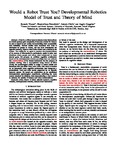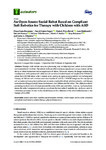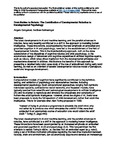Would a Robot Trust You? Developmental Robotics Model of Trust and Theory of Mind
| dc.contributor.author | Cangelosi, Angelo | |
| dc.date.accessioned | 2018-09-24T10:03:19Z | |
| dc.date.issued | 2019-03-11 | |
| dc.identifier.issn | 0962-8436 | |
| dc.identifier.issn | 1471-2970 | |
| dc.identifier.other | ARTN 20180032 | |
| dc.identifier.uri | http://hdl.handle.net/10026.1/12413 | |
| dc.description.abstract |
Trust is a critical issue in human-robot interactions: as robotic systems gain complexity, it becomes crucial for them to be able to blend in our society by maximizing their acceptability and reliability. Various studies have examined how trust is attributed by people to robots, but less have investigated the opposite scenario, where a robot is the trustor and a human is the trustee. The ability for an agent to evaluate the trustworthiness of its sources of information is particularly useful in joint task situations where people and robots must collaborate to reach shared goals. We propose an artificial cognitive architecture based on the developmental robotics paradigm that can estimate the trustworthiness of its human interactors for the purpose of decision making. This is accomplished using Theory of Mind (ToM), the psychological ability to assign to others beliefs and intentions that can differ from one’s owns. Our work is focused on an humanoid robot cognitive architecture that integrates a probabilistic ToM and trust model supported by an episodic memory system. We tested our architecture on an established developmental psychological experiment, achieving the same results obtained by children, thus demonstrating a new method to enhance the quality of human and robot collaborations. Keywords—trust, theory of mind, episodic memory, cognitive robotics, developmental robotics, human-robot interaction | |
| dc.format.extent | 20180032-20180032 | |
| dc.format.medium | ||
| dc.language | en | |
| dc.language.iso | en | |
| dc.publisher | Royal Society, The | |
| dc.subject | trust | |
| dc.subject | theory of mind | |
| dc.subject | episodic memory | |
| dc.subject | cognitive robotics | |
| dc.subject | developmental robotics | |
| dc.subject | human-robot interaction | |
| dc.title | Would a Robot Trust You? Developmental Robotics Model of Trust and Theory of Mind | |
| dc.type | journal-article | |
| dc.type | Journal Article | |
| dc.type | Research Support, U.S. Gov't, Non-P.H.S. | |
| plymouth.author-url | https://www.webofscience.com/api/gateway?GWVersion=2&SrcApp=PARTNER_APP&SrcAuth=LinksAMR&KeyUT=WOS:000465488000008&DestLinkType=FullRecord&DestApp=ALL_WOS&UsrCustomerID=11bb513d99f797142bcfeffcc58ea008 | |
| plymouth.issue | 1771 | |
| plymouth.volume | 374 | |
| plymouth.publication-status | Published | |
| plymouth.journal | Philosophical Transactions B: Biological Sciences | |
| dc.identifier.doi | 10.1098/rstb.2018.0032 | |
| plymouth.organisational-group | /Plymouth | |
| plymouth.organisational-group | /Plymouth/Faculty of Science and Engineering | |
| plymouth.organisational-group | /Plymouth/Research Groups | |
| plymouth.organisational-group | /Plymouth/Research Groups/Institute of Health and Community | |
| plymouth.organisational-group | /Plymouth/Research Groups/Marine Institute | |
| dc.publisher.place | England | |
| dcterms.dateAccepted | 2018-07-30 | |
| dc.rights.embargodate | 2019-3-26 | |
| dc.identifier.eissn | 1471-2970 | |
| dc.rights.embargoperiod | Not known | |
| rioxxterms.versionofrecord | 10.1098/rstb.2018.0032 | |
| rioxxterms.licenseref.uri | http://www.rioxx.net/licenses/all-rights-reserved | |
| rioxxterms.licenseref.startdate | 2019-03-11 | |
| rioxxterms.type | Journal Article/Review |




